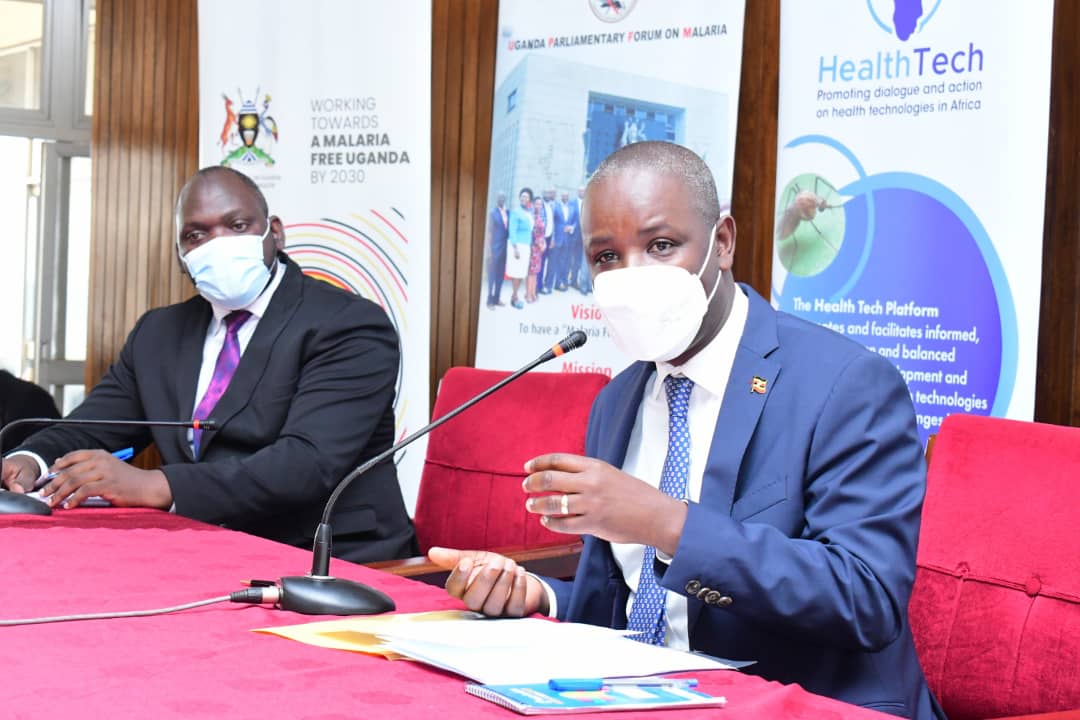“We need to start investigating the impact of funds allocated to fight malaria because allocating and releasing this money is one thing and appropriately utilizing it is another,” the Deputy Speaker, Thomas Tayebwa has said.
He said that he gets concerned when stakeholders in the fight against malaria hold expensive workshops instead of channeling that money into malaria treatment.
“We hear donors giving huge funds towards the malaria fight but when you track that money, you don’t see the impact. If you are fighting malaria, what are you doing in Serena Hotel eating expensive food? That money could be used to buy mosquito nets,” he said.
Tayebwa made these remarks while officiating at the commemoration of World Malaria Day at Parliament, organized by the Uganda Parliamentary Forum on Malaria on 04 May 2022. World Malaria Day is commemorated on 24 April and this year’s theme was ‘Harness innovation to reduce the malaria disease burden and save lives.
Tayebwa challenged the government to prioritize the malaria fight, saying that it should be mainstreamed in government infrastructure projects.
“Most of these projects have a component of social impact but they usually focus on HIV/AIDS and gender equality. Let us push for the inclusion of malaria in such projects. Why don’t we as MPs insist that at least one percent of the budgets of such projects are earmarked for malaria fight, especially sensitization,” he said.
Tayebwa also pledged to rally MPs to fight malaria in their constituencies.
“As leaders, we cannot look on as our children die of malaria. As leaders, we must commit to fighting malaria within the confines of our mandate. I come from a big rural community that is heavily affected by malaria, so I know what it means,” Tayebwa said.
Bukooli Island County MP, Hon. Peter Okeyoh called for affirmative action if the goal to eradicate malaria by 2030 is to be achieved.
“If there is no budget ring-fenced for malaria, then we should not pass the national budget. We need to be deliberate in the fight against malaria,” said Okeyoh.
Hon. Lillian Paparu (NRM, Arua district) also stressed the importance of mainstreaming the malaria fight in government projects saying that the disease is many Ugandans.
“Whether the government is undertaking projects in the infrastructure sector or education sector, the component of malaria fight should be included,” said Babaru.
The Board Chairperson of Malaria Free Uganda, Kenneth Mugisha challenged MPs to veto the passing of budgets, if all ministries, departments, and agencies do not have a budget for supporting the US$8 million funding for a malaria-free Uganda by 2030.
“Why don’t you as MPs contribute at least Shs500,000 towards the malaria fight? You spend so much money traveling to your constituencies to attend burials of those who die of malaria. If we mobilized this money as well as corporate organizations, I believe we shall bridge the gap in the malaria fight,” Mugisha added.
He, however, warned against the misuse of funds, saying that it is one of the vices faced in the fight against malaria.
Dr. Alfred Mubangizi, Assistant Commissioner, Health Services -Vector-Borne and Neglected Tropical Diseases at the Ministry of Health cited funding gaps as the biggest challenge in the fight against malaria.
He said that while the President started an initiative to kill mosquitos called Mosquito Larviciding, the funds allocated are insufficient.
“Currently, the project has been allocated Shs1 billion and yet we require Shs20 billion. This shortage has hindered the rollout of the initiative countrywide,” he said.
According to the World Malaria report 2019, Uganda is the third highest contributor of malaria cases, globally and the seven highest contributor to malaria deaths. The report adds that malaria kills 10 children every day in Uganda.


